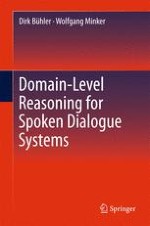2011 | OriginalPaper | Buchkapitel
Logic-Based Domain Modelling
verfasst von : Dirk Bühler, Wolfgang Minker
Erschienen in: Domain-Level Reasoning for Spoken Dialogue Systems
Verlag: Springer New York
Aktivieren Sie unsere intelligente Suche, um passende Fachinhalte oder Patente zu finden.
Wählen Sie Textabschnitte aus um mit Künstlicher Intelligenz passenden Patente zu finden. powered by
Markieren Sie Textabschnitte, um KI-gestützt weitere passende Inhalte zu finden. powered by
In this chapter, we describe our approach to a logic-based modelling of application domains. The modelling concerns structure of tasks that a user may want to achieve using a dialogue systems.We refer to these models
1
as
domain theories
. The task of the domain modelling can be broadly divided in two areas: The modelling of static information, i.e. structural information that does not change over time, and, on the other hand, the dynamic information which concerns time-dependent processes and changes in the states of objects. Of course, the two kinds of models are tightly interconnected in a typical application domain. Individual objects on the domain level, such as a geographical location or an appointment, are referred to as
entities
. Concerning the static information, the modelling of
classes
of entities can be distinguished from the modelling of their instances in a domain. The first problem is often referred to as the construction of a classification scheme, or ontology, while the latter has resemblance to representing items in a data base. Concerning the dynamic models, one of the most important aspects is the formalisation of so-called
fluents
and fluent change events. This approach is inspired by Allen and Ferguson’s Interval Temporal Logic (cf. Section 3.5). However, it is substantially adapted and extended in order to be useful in combination with our reasoning engine CIDRE (which is described in Chapter 5). We mainly defend the usefulness of our modelling approach by describing how important concepts from different domains are generalised into modules to form a library of reusable domain theories (cf. Section 4.4). In particular, we discuss the modelling of the TRAINS domain on the basis of the concepts introduced.
